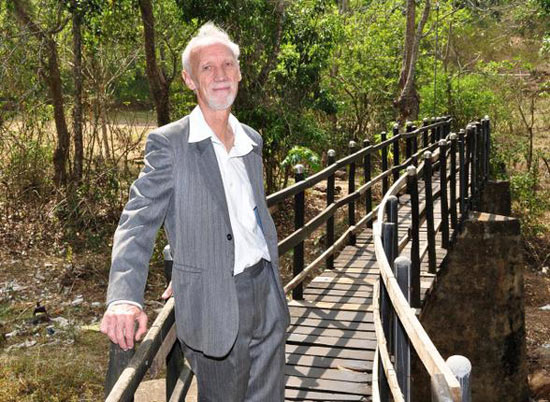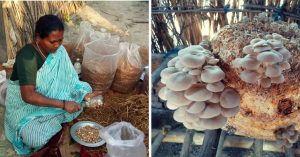TBI BLOGS: From Food to Electricity, This School Produces Everything It Needs In Its Own Backyard
This Kodaikanal school produces everything it needs in its own backyard. It is not just self-sufficient in food grains, vegetables and dairy but also in water and electricity. It provides a holistic approach to learning.

This Kodaikanal school produces everything it needs in its own backyard. It is not just self-sufficient in food grains, vegetables and dairy but also in water and electricity. It provides a holistic approach to learning.
Amidst the Palani hills of Tamil Nadu, in the lush green terrain of Kodaikanal, is the quaint Sholai School. In Tamil, ‘sholai’ means forest. Also known as the Centre for Learning Organic Agriculture and Appropriate Technology (CLOAAT), this is no ordinary school. Here, children learn with no fear or stress. There aren’t any awards, nor are there any punishments. There aren’t any exams. nor is there a rush to get ahead. As serene as the landscape is the school’s holistic approach to learning, laying emphasis on hands on experiences to open young minds.
Sholai School is the brainchild of Brian Jenkins, a British social anthropologist. Jenkins first came to India in 1969, to study at Bodhgaya. Inspired by J. Krishnamurthy, the great thinker and teacher, he began teaching at Krishnamurthy’s Brockwood Park School in the UK. And after 14 years, Jenkins set foot in India again to start something on his own. He located the scenic 100 acre area near Kodaikanal, where he began his school from a small building and a kitchen. Today it is a far bigger complex, housing classroom blocks, separate hostels for boys and girls, a dining area, a library, vast open spaces for farming, and the school’s very own dairy.
“The aim is to produce responsible citizens, who do not only relish the fruits of the earth but also learn to preserve it in return,” says Jenkins.


Similar Story

How Mushroom Cultivation Is Changing the Fortunes of Women in Rural India
Chattisgarh’s tribal communities, with limited job and economic opportunities, saw a significant chance when an organisation offered to train tribal women in starting a mushroom cultivation business. Jayashiree Elango explores further.
Read more >
One of the most distinctive characteristics of Sholai School is its ecological and sustainability practices. Self-sufficient in terms of food grains, fruit and vegetables, and dairy products, much of its food is grown in its own backyard, using organic farming methods. It even exports home-grown coffee to Germany. The food cooked in Sholai is 100% vegetarian, using bio gas. So it’s fresh food, healthy food. The dairy not only produces organic milk but also organic cheese.
Water from the hilly streams, wells and from rain water harvesting meets the requirements of the school, without having to depend on the municipal supply. And if this wasn’t enough, the school uses renewable energy too. Power is generated through photovoltaic panels and a micro-hydroelectric turbine, independent of the town grid electricity. There are solar panels in the entire school and four biogas plants to fuel the kitchen.
Jenkins does not believe in the existing hierarchical system of schools. Students from different classes and age groups are clubbed together for learning opportunities. He believes that learning ceases in classrooms – practical knowledge is out there in the field.
Perched on a hilltop, this school is surely one of a kind. Sholai is a school where children farm, segregate and recycle waste, manage livestock, and learn carpentry (they have made every piece of furniture for the school).


Similar Story

Burnout to Balanced: Here’s How Your Office Can Ensure You Are All Happy of Mind
Work-related stressors play a big part in causing or exacerbating mental health illnesses, and most workplaces are not equipped to deal with these issues.
Read more >
In addition, they learn horse riding, swimming, outdoor and indoor games, yoga, trekking, and bird watching.
If you found our stories insightful, informative, or even just enjoyable, we invite you to consider making a voluntary payment to support the work we do at The Better India. Your contribution helps us continue producing quality content that educates, inspires, and drives positive change.
Choose one of the payment options below for your contribution-
By paying for the stories you value, you directly contribute to sustaining our efforts focused on making a difference in the world. Together, let’s ensure that impactful stories continue to be told and shared, enriching lives and communities alike.
Thank you for your support. Here are some frequently asked questions you might find helpful to know why you are contributing?


A truly holistic learning approach such as this helps create better individuals and a better future for the world we live in.
All Images Courtesy Sholai CLOAAT
Like this story? Or have something to share? Write to us: [email protected], or connect with us on Facebook and Twitter (@thebetterindia).
This story made me
-
97
-
121
-
89
-
167










